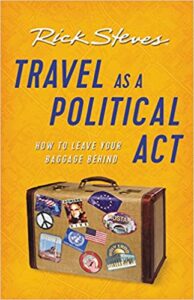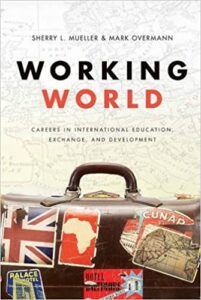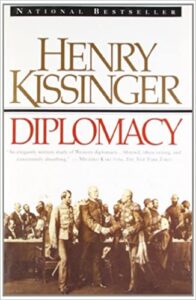This year back to school looks a little different, instead of buying supplies parents are figuring our the dynamics of virtual schooling. For young adults studying or hoping to pursue a career in the area of international relations or foreign policy realm, it is important to understand how interconnected our world is, to learn more about different cultures, and be globally literate. Literacy is extremely important not only in order to succeed but also in order to be able to make decisions and analyze situations. Through our various efforts, Meridian hopes to engage with and support future global leaders to not only consider international issues important but also have the knowledge and skills to be able to have meaningful conversations, make informed decisions and be active global citizens.
Check out our must-read selection below from the staff here at Meridan:
Travel as a Political Act by Rick Steves
This is not an intense analytical text like other IR reads. Through this book, Steves’s mission is to empower Americans to have trips that are fun, affordable, and culturally broadening. By traveling we are actually going firsthand to a place and experiencing it, we are better able to see the problems facing our world and come up with better solutions. Through this book, Steves helps the reader take that first step. Through his series of field reports from around the world, he explains how to “travel as a political act” and not only enjoy ourselves but also understand the interconnectedness of today’s world and expand our perspectives.
The Education of an Idealist: A Memoir by Samantha Powers
Through her memoir, Ambassador Samantha Powers answers the question question “What can one person do?” It takes the readers through her journey as an immigrant to becoming a war correspondent to then the presidential Cabinet official to her activism and humanitarian work. She writes about her battles and defining moments in her life and how she was able to juggle the demands of her job with the challenge of being a mother. Throughout the book she hints to the complexities of politics, reminding us how the United States can lead in the world.
 War on Peace by Ronan Farrow
War on Peace by Ronan Farrow
Acclaimed journalist and former diplomat, Farrow takes the reader through a firsthand account from Washington, D.C., to Afghanistan, Pakistan, and North Korea in the years since 9/11, and sheds light on consequential and poorly understood changes in American history. He interviews whistleblowers, policymakers, and a warlord, and people including Henry Kissinger and Hillary Clinton.He argues that diplomacy has diminished, the deterioration of the State Department, increased militarism.
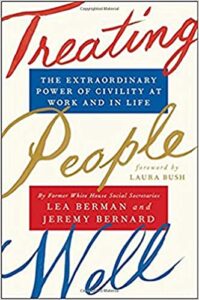 Treating People Well: The Extraordinary Power of Civility at Work and in Life by Jeremy Bernard and Lea Berman
Treating People Well: The Extraordinary Power of Civility at Work and in Life by Jeremy Bernard and Lea Berman
This book is a “how-to” guide to professional interactions, written by two former White House social secretaries. It has a balance of suggestions and anecdotal stories. They show the importance of always giving everyone you interact with respect and civility, and how that is a good way to build long-term relationships. They break down a lot of principles into much more manageable reading and helpful examples, topics range from confidence building to how to deal with workplace conflicts. Anyone aiming to work on Capitol Hill or on a diplomatic level should definitely give it a read.
Working World: Careers in International Education, Exchange, and Development by Sherry L. Mueller and Marc Overmann
This book is a perfect resource for those looking for help making career choices, especially in the fields listed in the title In the book the authors take on the role of guidance counselors and offer valuable insight on launching a career. The book also provides resources including annotated lists of selected organizations, websites, and further reading. Twelve professionals, in different career levels, provide insight into their career choices, what lessons learned, and give practical advice about building a career in international affairs.
 Prisoners of Geography: Ten Maps That Explain Everything About the World by Tim Marshall
Prisoners of Geography: Ten Maps That Explain Everything About the World by Tim Marshall
Marshall explains the geo-political strategies of world powers through the use of ten maps of crucial regions. He provides to provide much-needed insight into how the physical characteristics of various countries affect their power and the decisions their leaders make. The role of geography in politics is of course of utmost importance. Marshall spells out how geography defines national interests and creates the conditions for conflict. It is a quick read and it is a highly readable overview for interpreting the politics of today.
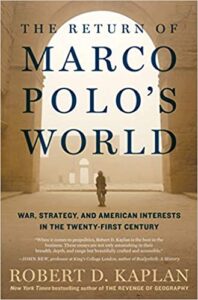 The Return Of Marco Polo’s World: War, Strategy, and American Interests in the Twenty-First Century by Robert Kaplan
The Return Of Marco Polo’s World: War, Strategy, and American Interests in the Twenty-First Century by Robert Kaplan
Through short essays Kaplan lays out a blueprint of the world’s changing power politics. He draws on his firsthand experiences as a foreign correspondent and military embed for The Atlantic, and outlines the timeless principles that should shape America’s role in the world. He gives a frank examination of what will happen in the case of a war with North Korea and discusses other difficult choices the United States will face in the years ahead.
The Tyranny of Experts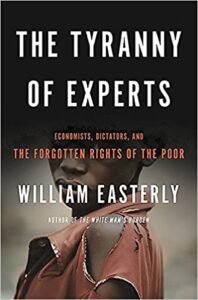 William Easterly
William Easterly
The recommended solutions for global poverty fix immediate problems but do not address the systemic factors that cause them, and in many cases leads to the exploitation of the poor. In this book economist William Easterly, traces history of the fight against global poverty, he indicates how the tactics that have used squash the freedom of the poor, and how they have also suppressed conversations to find alternative approachs. He presents a wealth of economic research, and argues that the world needs a new model of development. An approach that protects and respects the rights of people in developing countries, that understands that a state has unchecked powers. Read more to find out how we can end global poverty once and for all.
The No-Nonsense Guide to International Development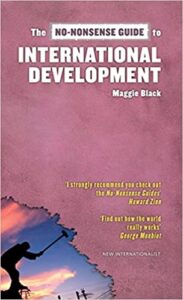 Maggie Black
Maggie Black
If you are interested in international development then this is a good place to start. It documents main points in the international development processes and also provides a critique. It explains the history of development and global happenings that affected it, has case studies and mentions various development programs. The book places an emphasis on places on local and bottom-up development.
Although a bit old, it is a thorough history book. It covers diplomatic history of Europe though WWI, WWII and the Cold War, the Vietnam War. It also includes a short memoir, he uses this section to justify his political decisions and views. KIssinger also makes predictions and policy prescriptions for the US circa 1994.














